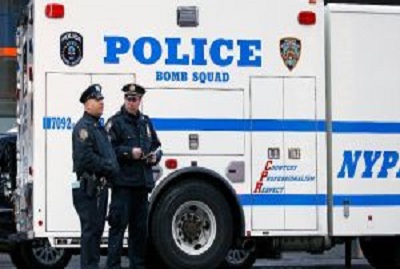New Hampshire Anti-Opioid Dragnet Results in Nabbing 38 Suspects in ‘Devil’s Highway’

 Thirty-eight suspects were charged with breaking federal drug laws, and as many as a dozen more suspects are facing state charges in New Hampshire , as part of a 10-week coordinated enforcement operation in Merrimack Valley called “Devil’s Highway.” Most of the narcotics which were seized by the federal and local cops were fentanyl, heroin and deadly heroin-laced-with fentanyl, according to the Department of Justice.
Thirty-eight suspects were charged with breaking federal drug laws, and as many as a dozen more suspects are facing state charges in New Hampshire , as part of a 10-week coordinated enforcement operation in Merrimack Valley called “Devil’s Highway.” Most of the narcotics which were seized by the federal and local cops were fentanyl, heroin and deadly heroin-laced-with fentanyl, according to the Department of Justice.
The 10-week anti-drug operation, which took place during the summer months of June through September 2019, was a coordinated law enforcement operation involving federal, state, and local partners to focus on drug distribution activity in the City of Lawrence and as well as between Lawrence and destinations within New Hampshire.
The operation targeted the trafficking and peddling of opioids, including fentanyl and heroin, and resulted in charges against a total of 38 people for federal drug offenses, with at least a dozen more individuals facing state charges. In total, Operation Devil’s Highway resulted in the seizure of more than 14 kilograms of fentanyl, five kilograms of heroin, 29 kilograms of cocaine, four firearms, and body armor.
“Operation Devil’s Highway was tremendously successful in targeting street-level drug trafficking in Lawrence, which is a hub of illegal drug distribution for all of New England,” said United States Attorney Andrew E. Lelling. “This kind of operation can only succeed with the full commitment of federal, state and local law enforcement agencies, coupled with realistic planning to target the most prolific drug distributors. This will not be the last time we target drug dealers in Lawrence or their customers from points north.”
Andrew E. Lelling was sworn in as U.S. Attorney for the District of Massachusetts on Dec. 21, 2017.
“Operation Devil’s Highway should serve as a warning to others thinking of filling the void created by these arrests—we aren’t finished. Everyone arrested this summer allegedly exploited Lawrence as their drug-trafficking hub, bringing perilous opioids like fentanyl and heroin – in addition to cocaine and marijuana – to neighborhoods across New England,” said Joseph R. Bonavolonta, Special Agent in Charge of the FBI Boston Division. “That’s why the FBI and our law enforcement partners will not relent in putting those distributors profiting from addiction and lawlessness out of business, so that the hometowns they harm might heal.”
 “The DEA’s [Drug Enforcement Administration’s] top priority is combating the opioid epidemic by bringing to justice anyone who distributes deadly drugs,” said DEA Special Agent in Charge Brian D. Boyle. “Illegal drug distribution ravages the very foundations of our families and communities. These enforcement actions with our federal, state and local partners show what happens when law enforcement works together.”
“The DEA’s [Drug Enforcement Administration’s] top priority is combating the opioid epidemic by bringing to justice anyone who distributes deadly drugs,” said DEA Special Agent in Charge Brian D. Boyle. “Illegal drug distribution ravages the very foundations of our families and communities. These enforcement actions with our federal, state and local partners show what happens when law enforcement works together.”
“The scourge of addiction continues to be fueled by Transnational Criminal Organizations who flood the streets of our commonwealth with poison. Motivated only by profit, we know all too well, that tackling this complex threat involves a united, comprehensive strategy and an aggressive approach by multiple entities across all levels of government,” said Jason J. Molina, Acting Special Agent in Charge, U.S. Immigration and Customs Enforcement’s Homeland Security Investigations (HSI), in Boston, Massachusetts.
“The results of this operation should send a clear message that HSI Special Agents remain committed to combatting the opioid crisis by pursuing traffickers at every level of the supply chain,” said SAIC Molina.
The majority of criminal charges resulted from weekly “sweeps” in the City of Lawrence that targeted individuals distributing opioids. The enforcement actions brought together 40-60 federal, state, and local officers from Massachusetts and New Hampshire each week to conduct surveillance, investigate and arrest defendants.
- The federal charge of drug distribution provides for a sentence of up to 20 years in prison, at least three years of supervised release and a $1 million fine.
- The charge of distribution of 40 grams or more of fentanyl provides for a minimum of five years and up to 40 years in prison, at least four years and up to a lifetime of supervised release and a $5 million fine.
- Charges of distribution of 400 grams or more of fentanyl and distribution of five kilograms or more of cocaine each provide for a minimum of 10 years and up to life in prison, at least five years and up to a lifetime of supervised release and a $10 million fine.
Sentences are imposed by a federal district court judge based upon the U.S. Sentencing Guidelines and other statutory factors.


